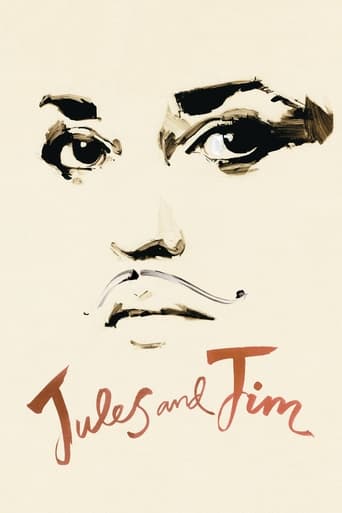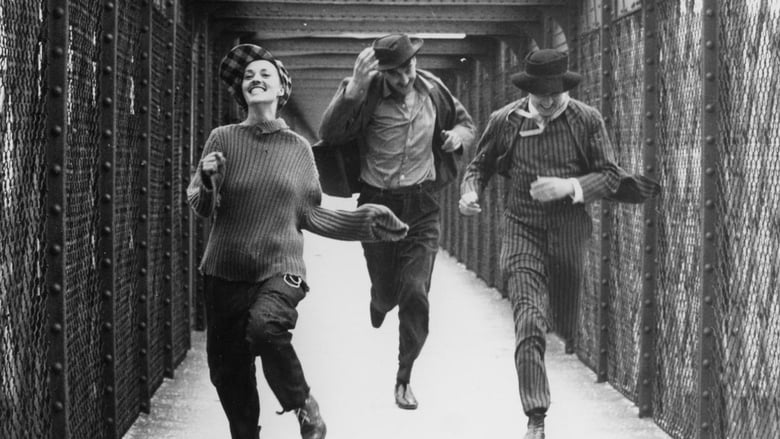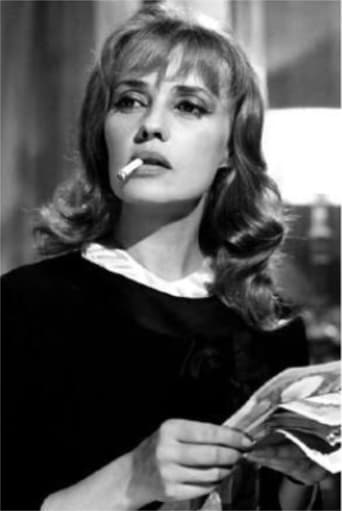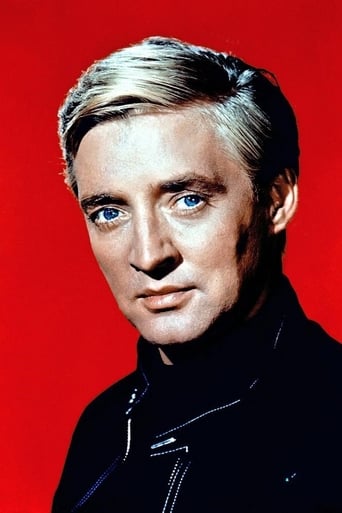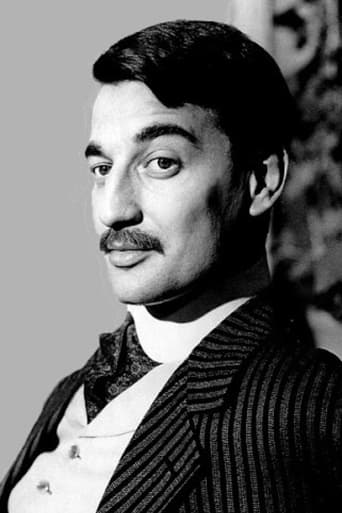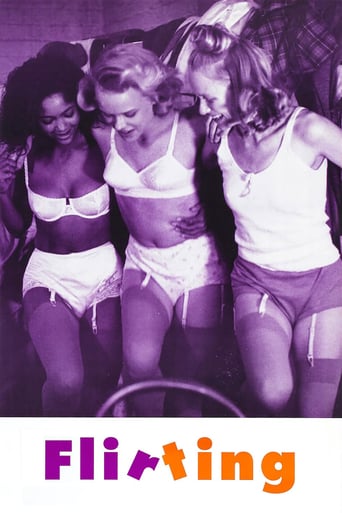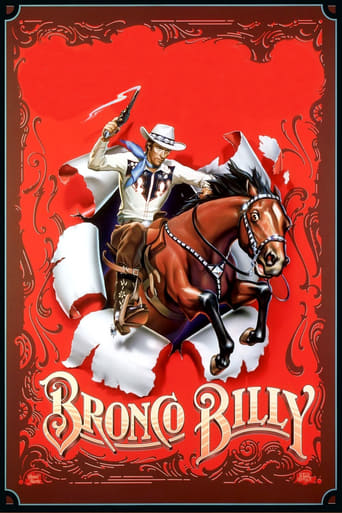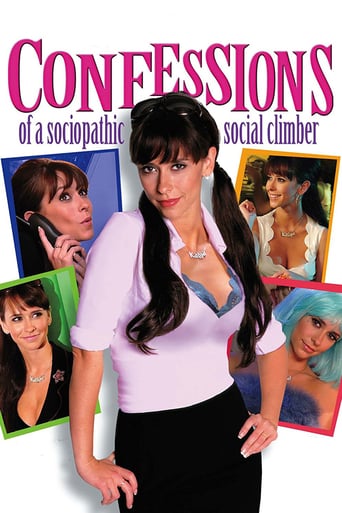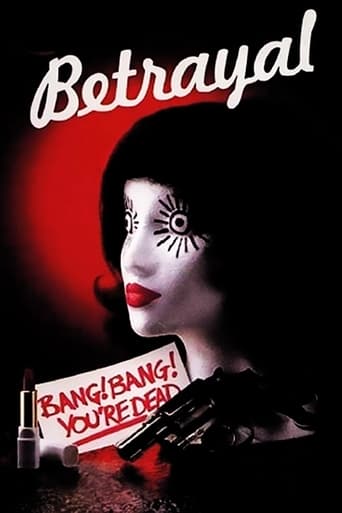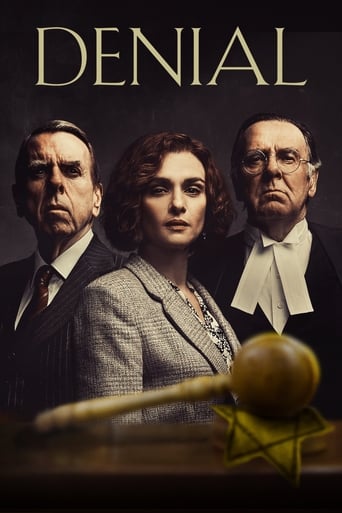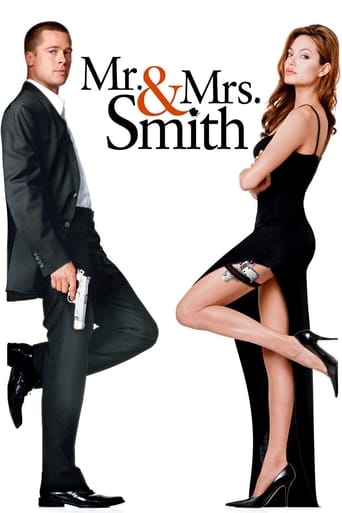Jules and Jim (1962)
In the carefree days before World War I, introverted Austrian author Jules strikes up a friendship with the exuberant Frenchman Jim and both men fall for the impulsive and beautiful Catherine.
Watch Trailer
Cast


Similar titles
Reviews
Good movie but grossly overrated
Beautiful, moving film.
I cannot think of one single thing that I would change about this film. The acting is incomparable, the directing deft, and the writing poignantly brilliant.
The acting in this movie is really good.
I had never intended to watch this movie, having found Truffaut at best okay and at worst, as in Shoot the Piano Player, everything I hate about French cinema. But after my girlfriend said she had really liked this movie years ago I decided to take a look.First off, I don't like Jules and Jim. They are too utterly passionless guys who intellectualize and prattle on. I don't care about their lives.As for Catherine, she's not so much a person as a collection of enigmas strung loosely together. The goal seemed to be to portray the WOMAN AS MYSTERY, but doing a bunch of random, weird things is more likely a sign of mental illness, and Catherine is never made real enough to seem mad or sane. She's just MYSTERIOUS.After a half hour I was wondering why this movie was such a big deal, so I took a break to read some articles on it. Apparently, the way it was filmed was fairly original, with freeze frames and hand-held cameras and newsreel footage. The best moments are weird jumpy moments set during the film's unnecessary voiceovers, which unfortunately I couldn't completely enjoy because I had to read the subtitles.Which is fine, but I never felt the purpose behind it. Films like Hiroshima Mon Amour and Citizen Kane did unusual, original things, but they did them for specific purposes that propelled the story and informed the feel. Sometimes Jules et Jim uses its gimmicks to good effect, as in the race across the bridge, but often it just feels like it's just tossing in stuff with no real purpose.I started watching again, but the insufferable characters kept being insufferable and the story kept being nonexistent. Then I read a plot summary which made me decide to fast forward to the only part of the movie when anything happens. It seemed dumb, but I admit that since I skipped forward its possible I missed context.This is a very French movie, by which I mean it's incredibly talky and no one says anything interesting.
After spending April watching 30 Czech films from the Cold War era,I decided that for the next 100 days I would watch 100 French films.With April coming to the end,I started searching round for the Criterion edition of Jules & Jim,but I soon realised that I had forgotten where I've put the disc! Franticly looking round,I was happy to discover that Artificial Eye have also put a DVD version of the title out,which luckily gave me the chance to meet Jules and Jim.The plot-1912:France:Being on his own after moving from Austria to France, Jules is delighted to meet Jim,who shares Jules bohemian outlook on life.Spending time with each other,Jules and Jim begin to bond over the arts and poetry. Taking things only to a "no-strings" level with women,Jim and Jules both cross paths with a mysterious girl called Catherine,who they both fall in love with. Aware of their shared love for Catherine,Julies and Jim try to keep their friendship alive,as WWI breaks out. View on the film:Warmly welcoming Jules & Jim, Artificial Eye give the title a sharp transfer,which smoothly catches the lightning shots,and also keeps the dialogue crisp. Breezing in from Marie Dubois's wonderful mile a minute performance as Thérèse,the gorgeous Jeanne Moreau gives a marvellous performance as Catherine. Entwining Jules and Jim with a magnetic smile, Moreau strikes a precise balance of keeping Catherine's alluring charms alight whilst making her frivolous outlook more brittle.Working in Comedy clubs when he was cast, Henri Serre gives a superb performance as Jim.Swaggering around the opening brimming with confidence, Serre vividly peels away Jim's charisma to reveal a sincere friendship with Jules,and an inability to look away from the flames of his love for Catherine.Enter as an outsider, Oskar Werner gives a great performance as Jules,whose nervous stance tightens the bond of friendship he has with Jim,and also pulls Jules to the care- free grin of Catherine.Spanning the WWI period,co-writer/(along with Jean Gruault) director François Truffaut adaptation of Henri-Pierre Roché's novel places the passage of time firmly on the shoulders of the trio,with their care-free and bohemian outlooks struggling to survive the abrasive twists and turns that Catherine grinds Jim and Jules friendship with.Whilst there are some large areas of plot that get brushed away, (does no one care about the kid?!) Gruault and Truffaut treat the friendship between Jules and Jim with a brilliant level of care and affection,as Jules and Jim try to find ways to keep their connection,despite being well aware that they share a love for the same girl.Rolling out on a very low budget, (Moreau had to help fund the completion of production)director Truffaut and cinematographer Raoul Coutard roll out the friendship between Jules,Jim and Catherine in a dazzling,ultra-stylised shine. Soaking the screen in pure French New Wave with freeze frames and "masking", Truffaut elegantly explores the various stages of Jules and Jim's friendship,as the initial excitement around each other sets off whip-smart panning shots and slick screen wipes,which transforms into smoothly-hit tracking shots and ghostly overlapping images,as Jules,Jims and Catherine's friendship reaches breaking point.
I'd heard of this film over the years with an element of genius assigned to it, but as I viewed it the other day I was genuinely underwhelmed. The principal characters simply don't strike me as real people. They exist with virtually no reaction to situations that would make ordinary people respond with emotions ranging from jealousy and insecurity to outright rage and hatred. In fact, at the picture's finale I began wondering whether there was an element of mental illness in the character of Catherine (Jeanne Moreau). It's one thing to be driven to suicide by severe depression, but that didn't seem to be a factor in Catherine's make up. And if she wanted to kill herself on a whim, why commit murder at the same time by taking her lover Jim (Henri Serre) with her? It's not like he had a voice in the decision.Leading up to that, the whole relationship among the principals seemed rather surreal. Drawn into an affair with Catherine long after he had been best friends with Jules (Oskar Werner), Jim himself seems to have a directionless life following the Great War. He's about ready to propose to his girlfriend Gilberte (Vanna Urbino) and instead is drawn into an unsatisfying relationship with Catherine, who makes no secret of having regular dalliances with other men as well. For her part Catherine leaves Jules for a period of six months, and he's left to care for himself and their young daughter in the interim.Am I missing something here? 'Normal' people don't live this way, but then again, normal may have been redefined over the past four decades since this film came out. But there was just no warming up to these characters as the film progressed and it left me with just a perverse reaction when it was all over. I would try again, but my instincts are usually correct the first time.
Suphie Wesner 10/08/2012 Jules and Jim Movie Reviews, all by François TruffautThese three movies are all hall-marks of Truffaut's classically appealing style; somehow, whether in color or in black and white, Truffaut always manages to "get it right." What we mean by this is, he either chooses really charming characters who win our hearts (and minds), or he has interesting and intriguing (unusual) story-lines, or, indeed, Truffaut just simply has good ideas to write about (let's face it, though, he simply does, sometimes, use a lot of the same themes, about love, married women, and threesomes, though, not in a sexual way)... In Jules et Jim, this interesting, intriguing, film with charming characters, albeit a really downer ending and theme (kind of a Romeo and Juliet type thing; a woman scorned who goes to the last extreme to avenge herself of the death of her lover's love for her, a murder-suicide), really pulls us in with its starting premise; a lonely blond woman, named Therese, must face the facts when her abusive, drinking, though, at least politically motivated (anarchist) husband, screams at her and she considers that the last straw. In general, too, we find that the movie has a lot of good moral qualities: we see that, though this woman basically "shares" these two men, she toys with their hearts minimally, and genuine love is valued a lot. Indeed, we see that she "goes for" Jules, the German-looking Frenchman, while Jim is sort of her lover on the side. It is a complicated piece by Truffaut, set in the 1800's when trains were still all the rage, the can-can was coming to the fore of the entertainment scene, and costumes included hooped skirts, tail coats, top hats, fancy shirt cuffs, stiff bibs, wool rags, and spats... Interestingly enough, though, we see that a woman in 1800's France was not looked down upon simply for seeing two men, this was not enough to label her a "whore" in most people's eyes, or they didn't know about it, and people would not look at this situation in naive shock and disbelief, like they might in more Victorian societies. Indeed, we find that Therese, and, later , Jim's wife, Catherine, enjoys equal respect from both men, something which is indeed unusual and to be cherished by any sweet, rather innocent, and popular object of another two competing people's affection. Yes, we see through this movie, Jules and Jim, the saying "Hell hath no fury like a Woman Scorned" brought to life in no better way possible; indeed, we realize that women like men, but in a different way, really are sensitive to having their feelings or emotions for another, scorned; when she senses this, the main character, decides to try to kill her beloved, though she loves him, right then and there. For heaven's sake, the woman, in fact, did write letters like no other to her lover, Jim, professing her love to him, passionately. He would write back but there seemed always to be the unremitting circumstances which would not permit them to marry and stay together. Jules was always the simpler of the two friends, which can mean great things, that he was less of a back-stabber, for one. So, what is the reason, here? Because he will not have her love-child, as he is in difficult circumstances at the moment, married with a child, or with another child on the way. So, we soon see, that, indeed, she is crazed enough by love and remorse to want to commit murder (she is also, generally, mentally unwell, and suicidal, to boot) with her shot-gun at her side, but, instead, she takes him for a last, eerie ride, and then drives the old Model T-, or early version of a Model T-ford off the edge of a bridge and thus, kills them, both. So we then see that, indeed, their bodies are made into ash (by having their bones ground; this interesting process is shown by the film, no less), and the two lovers love made immemorial, and forced to be made immortal, forever. The film finally ends by showing German-looking Jules (I thought he had to be German when I first saw him; shows how caught-unawares I was when first sitting through this film, I had no idea at the time, even, that Jules was a French name. This took a while to sink in, for me, as the "s" is suspiciously pronounced, in fact). . . . . He is left alone with his love-child from the beautiful Bohemian-woman-turned-crazy-woman, but he looks as though he shall miss his two friends indefinitely, as these were his sole, close, bosom buddies, for a long while, and they taught him a lot about life, love, and joy. The film shows that, alas, life sometimes does go haltingly, but perseveringly, on. This tale of turn-of-the-century Paris, and, indeed, sometimes, rural France, was a real winner, and a period film, at that, not to be missed. It is high drama, and high art, all in one. Acting is done by at least one famous actress, that is to say, Jeanne Moreau, and the part played by Jim, too, at least by French audiences, is relatively well-known, Oskar Werner. Jules was just played by, HENRI SERRE.

